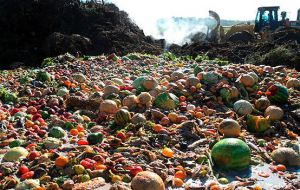MercoPress. South Atlantic News Agency
Food loss and waste in Latam could feed the region's 47 million hungry
 “Addressing this issue is essential for progress in the fight against hunger and must become a priority for governments in the region” said Benitez
“Addressing this issue is essential for progress in the fight against hunger and must become a priority for governments in the region” said Benitez  The loss and waste occur throughout the food chain: 28% occur at the consumer level, 28% at the production level, 17% in market and distribution
The loss and waste occur throughout the food chain: 28% occur at the consumer level, 28% at the production level, 17% in market and distribution In Latin America and the Caribbean more food is lost and wasted than is needed to meet the nutritional needs of the 47 million people who still suffer from hunger in the region, according to FAO. The report Losses and waste of food in Latin America and the Caribbean of the FAO Regional Office says that 6% of global food losses occur in the region.
“Each year, the region loses or wastes about 15% of its available food, which impacts the sustainability of food systems, reduces local and global availability of food, generates less income for farmers and increases prices for consumers” explained FAO Regional Representative Raul Benitez.
Benitez added that losses and waste also have a negative effect on the environment due to the unsustainable use of natural resources. “Addressing this issue is essential for progress in the fight against hunger and must become a priority for governments in Latin America and the Caribbean,” Benitez said.
According to FAO, the losses are related to a decrease in the amount of food available for human consumption in phases of production, post-harvest, storage and transport. Food waste refers to losses resulting from the decision to discard food that still have nutritional value, and it is typically associated with the behavior of the wholesalers and retailers, retail food services and consumers.
The loss and waste occur throughout the food chain: in the region, 28% occur at the consumer level, 28% at the production level, 17% in the market and distribution, 22% during the handling and storage, and the remaining 6% during the processing level.
With food that is lost in the region in the retail industry, i.e. supermarkets, farmers´ markets, shops, etc. more than 30 million people could be fed. That number accounts for 64% of those suffering from hunger in the region.
The amount of food that is lost at the retail level in the Bahamas, Jamaica, Trinidad and Tobago, Belize, Colombia is sufficient to feed all those suffering from hunger in those countries.
Antigua and Barbuda, the Bahamas, Jamaica, Saint Kitts and Nevis, Trinidad and Tobago, Belize, Bolivia, Colombia, Ecuador, El Salvador, Surinam and Uruguay would have enough food to achieve the first Millennium Development Goal, if retail losses alone were reduced.
“While it is important to note that the countries of the region have more than enough calories to feed all its citizens, the huge amount of food lost or thrown in the garbage is simply unacceptable as hunger continues to affect almost 8% of the regional population”, said Raul Benitez.
There are ways to avoid losses and waste in every link of the chain, primarily through investments in infrastructure and physical capital, improving the efficiency of food systems and governance that includes regulatory frameworks, investment, incentives and strategic alliances between public and private sector.
One example is food banks, which gather food that for various reasons would be discarded for redistribution, and that already exist in Costa Rica, Chile, Guatemala, Argentina, Dominican Republic, Brazil and Mexico. The Food Banks Association of Mexico, for example, rescued 56 thousand tons of food in 2013 alone.




Top Comments
Disclaimer & comment rulesCommenting for this story is now closed.
If you have a Facebook account, become a fan and comment on our Facebook Page!